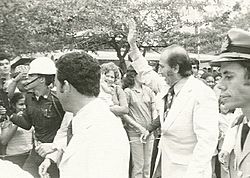Carlos Andrés Pérez facts for kids
Quick facts for kids
Carlos Andrés Pérez
|
|
|---|---|
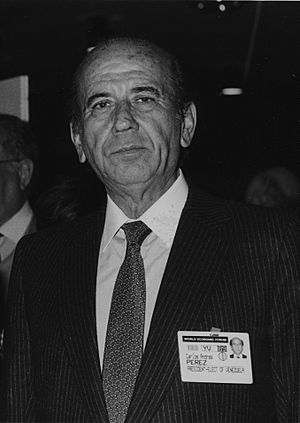
Pérez in 1989
|
|
| President of Venezuela | |
| In office 2 February 1989 – 21 May 1993 |
|
| Preceded by | Jaime Lusinchi |
| Succeeded by | Octavio Lepage (acting) |
| In office 12 March 1974 – 12 March 1979 |
|
| Preceded by | Rafael Caldera |
| Succeeded by | Luis Herrera Campíns |
| Senator of Venezuela For Life |
|
| In office 12 February 1999 – 28 March 2000 |
|
| In office 12 March 1974 – 2 February 1994 |
|
| Vice President of the Socialist International | |
| In office 30 January 1976 – 30 January 1992 |
|
| President | Willy Brandt |
| Minister of Home Affairs of Venezuela | |
| In office 12 March 1962 – 12 August 1963 |
|
| President | Rómulo Betancourt |
| Preceded by | Luis Augusto Dubuc |
| Succeeded by | Manuel Mantilla |
| Member of the Chamber of Deputies of Venezuela | |
| In office 5 January 1964 – 5 January 1968 |
|
| Constituency | Táchira |
| In office 5 January 1958 – 2 February 1960 |
|
| Constituency | Táchira |
| In office 5 January 1947 – 24 November 1948 |
|
| Constituency | Táchira |
| Personal details | |
| Born |
Carlos Andrés Pérez Rodríguez
27 October 1922 Rubio, Táchira, Venezuela |
| Died | 25 December 2010 (aged 88) Miami, Florida, U.S. |
| Political party | Acción Democrática |
| Spouse | Blanca Rodríguez |
| Domestic partner | Cecilia Matos |
| Children |
|
| Alma mater | Central University of Venezuela Free University of Colombia |
| Signature | |
Carlos Andrés Pérez Rodríguez (born October 27, 1922 – died December 25, 2010) was a Venezuelan politician. People often called him CAP or El Gocho because he was from the Andes region. He served as the president of Venezuela two times: first from 1974 to 1979, and again from 1989 to 1993. He was one of the people who helped start Acción Democrática, a very important political party in Venezuela during the second half of the 1900s.
His first time as president was known as Saudi Venezuela. This was because the country had a lot of money from selling oil, which led to good economic times. However, his second time as president was harder. Venezuela faced economic problems, social unrest, big riots called Caracazo, and even two attempts to overthrow the government in 1992. In May 1993, he became the first Venezuelan president to be removed from office by the Supreme Court. This happened because of accusations that he had misused public money.
Contents
Early Life and Education
Carlos Andrés Pérez was born on a farm called La Argentina, near the town of Rubio in Táchira state, close to the border with Colombia. He was the 11th of 12 children in a family that was not rich but not poor either. His father, Antonio Pérez Lemus, was a coffee farmer and pharmacist from Colombia. His mother, Julia Rodríguez, came from a well-known family in Rubio.
Pérez went to the María Inmaculada School in Rubio. He spent his childhood both in town and on his family's coffee farms. His grandfather loved books, and this made Pérez start reading a lot from a young age. He read classic books by authors like Jules Verne and Alexandre Dumas. As he got older, he also became interested in politics and secretly read books by thinkers like Voltaire and Marx.
When Pérez was a teenager, his family faced tough times. Coffee prices dropped, and his father had business problems. His father died in 1936. This led his mother and brothers to move to Caracas, Venezuela's capital, in 1939. His father's death made a big impact on young Pérez. It made him believe even more strongly that democratic freedoms were important to protect people from unfair government power.
In Caracas, Pérez went to the Liceo Andrés Bello school and finished in 1944. He then studied law at the Central University of Venezuela and the Free University of Colombia. But he was so involved in political activities that he never finished his law degree.
Political Journey
Carlos Andrés Pérez started his political journey when he was just 15 years old. He helped create the Venezuelan Youth Association and joined the National Democratic Party. Both groups were against the government of General Eleazar López Contreras. He also worked with the first labor unions in his area. When he moved to Caracas in 1939, he quickly became a youth leader. He also helped found the Democratic Action (AD) party. He became a close friend of the party's founder, Rómulo Betancourt, and later became a major political leader himself.
In October 1945, a group of civilians and young soldiers overthrew the government. At 23, Pérez became a private secretary to the new leader, Rómulo Betancourt. In 1948, when the military took over again, Pérez had to leave Venezuela. He lived in places like Cuba, Panama, and Costa Rica for ten years. He even secretly returned to Venezuela in 1952 to help fight the new dictatorship. He was put in jail several times and spent more than two years there. In Costa Rica, he worked as an editor for a newspaper and stayed in touch with other AD leaders.
In 1958, after the dictator Marcos Pérez Jiménez was removed, Pérez came back to Venezuela. He helped rebuild the AD Party. From 1959 to 1964, he served as the Minister of Interior and Justice. In this role, he worked to calm down small rebellions happening in the country. This helped Venezuela become more peaceful and stronger as a democracy. However, some people accused him of human rights violations during this time.
After Betancourt's time as president ended, Pérez left the government for a while. He focused on gaining more support within his party. He became the head of the AD in Congress and then the Secretary General of AD. These roles were very important in preparing him to run for president.
First Time as President
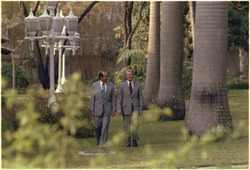
In 1973, Carlos Andrés Pérez was chosen to run for president for the AD party. He was young and full of energy. His campaign was very lively and successful. It was one of the first campaigns in Venezuela to use American advertising experts. He traveled all over Venezuela, visiting almost every village and city, walking more than 5800 kilometers. In December 1973, he won the election with 48.7% of the votes. An amazing 97% of all eligible voters participated in this election, a record that has not been broken since.
One of Pérez's main ideas was that oil could help developing countries like Venezuela become rich and create a fairer world. Events like the Yom Kippur War in 1973 caused oil prices to go up a lot. This brought huge amounts of money to Venezuela just as Pérez became president. His plans were very big and involved spending a lot of government money, almost $53 billion. He took control of the iron and oil industries for the government. He also invested in large state-owned projects to produce aluminum and hydroelectric energy. He improved roads and buildings and funded social programs and scholarships. His efforts to protect the environment earned him the Earth Care award in 1975. He was the first Latin American leader to receive this award.
On the world stage, Pérez supported democratic ideas in Latin America and other parts of the world. He started diplomatic relations with Cuba again. He also worked to lift economic restrictions against Cuba. He was against dictatorships in Nicaragua and Chile. He played a key role in the agreement to transfer control of the Panama Canal from the United States to Panama. In 1975, he helped create SELA, the Latin American Economic System, with the Mexican President Luis Echeverría. This group was made to help countries in Latin America work together on economy and science. He also supported democracy in Spain.
Towards the end of his first term, some people criticized Pérez for spending too much government money. His government was sometimes called "Saudi Venezuela" because of its big plans. There were also concerns about corruption and people using their connections for personal gain. Many citizens felt that the oil money had not been managed well. Venezuela was importing 80% of its food. Farming was not growing. The country's debt had grown very large. Even though people in Caracas and other big cities seemed to be doing well, many Venezuelans were still poor. This led to his party losing the 1978 election. The new president, Luis Herrera Campíns, famously said that he was "inheriting a mortgaged country."
After the First Term
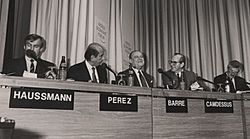
Carlos Andrés Pérez remained active in international affairs. In 1980, he became president of the Latin American Association of Human Rights. He worked with the president of Tanzania to organize the South-South Commission. He was also very active in the Socialist International, serving as its vice-president for three terms. He worked with Willy Brandt to expand the Socialist International's activities from Europe to Latin America. In 1988, he joined a group of freely-elected leaders started by former US President Jimmy Carter. He also led a conference at Harvard University about foreign debt in Latin America.
Second Time as President
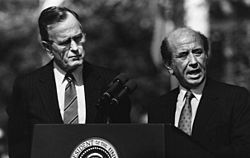
In February 1989, at the start of his second term, President Pérez agreed to a plan from the International Monetary Fund (IMF). In return, Venezuela received a loan of $4.5 billion US dollars. This agreement came shortly after he won the 1988 presidential election. Venezuela was facing difficult economic times. The new economic changes, especially raising petrol prices, caused public transport costs to go up immediately. This led to huge protests and looting that started in Guarenas and spread to Caracas, the capital. These events are known as El Caracazo. The government declared a state of emergency, and many people died.
By late 1991, Pérez's government received over $2.2 billion US dollars from selling state-owned companies. The most notable sale was CANTV, a telecommunications company. It was sold for $1.885 billion US dollars. This sale ended Venezuela's government control over telecommunications. By the end of that year, inflation had dropped, Venezuela's international money reserves were high, and the economy was growing by 9%. This was the fastest growth in Latin America at the time.
In 1992, his government survived two attempts to overthrow it. The first attempt happened on February 4, 1992, led by Lieutenant-Colonel Hugo Chávez. Chávez later became president of Venezuela. When his coup failed, Chávez was allowed to speak on national television. He famously said he had failed "por ahora"—"for now." The second attempt, on November 27, 1992, was much more violent and resulted in more deaths.
Removal from Office
On March 20, 1993, the Attorney General, Ramón Escovar Salom, started a legal case against Pérez. He was accused of misusing 250 million bolivars from a special presidential fund. The issue had first been brought to public attention by a journalist in November 1992. The money was said to have been used to support elections in Nicaragua and to hire bodyguards for President Violeta Chamorro. On May 21, 1993, the Supreme Court agreed that the accusation was valid. The next day, the Senate voted to remove Pérez's immunity, which protects a president from legal action. Pérez did not want to resign. However, after 90 days of temporary leave, the National Congress permanently removed him from office on August 31.
After Presidency
Pérez's trial ended in May 1996, and he was sentenced to 28 months in prison.
In 1998, he faced new accusations of misusing public money. He was accused of having secret bank accounts in New York. Before this trial, he was elected to the Senate of Venezuela for his home state of Táchira. This election gave him protection from legal cases. However, a new Constitution of Venezuela was approved in 1999. It dissolved the Senate and created a new National Assembly. Because of this, Pérez lost his Senate seat. In 1999, he ran for the National Assembly again but did not win a seat. On December 20, 2001, while he was in the Dominican Republic, a court in Caracas ordered his arrest for misusing public funds.
After that, he moved to Miami, Florida, where he lived in self-exile. From there, he became an opponent of President Hugo Chávez. On October 23, 2003, at 80 years old, he had a stroke that left him partly disabled.
Death
Carlos Andrés Pérez died on Saturday, December 25, 2010, at Mercy Hospital in Miami. The cause of death was reported as respiratory failure. His remains were brought back to Venezuela on October 4, 2011, nine months after his death. The casket arrived on a flight from Atlanta, escorted by the Mayor of Caracas, Antonio Ledezma. In Caracas, it was taken to the headquarters of his party, AD, where over 5,000 people waited to see it. Pérez was buried on Thursday, October 6, 2011.
Honours
Foreign honours
 Italy:
Italy:
 Knight Grand Cross with Collar of the Order of Merit of the Italian Republic (17 November 1976)
Knight Grand Cross with Collar of the Order of Merit of the Italian Republic (17 November 1976)
 Portugal:
Portugal:
 Grand Collar of the Military Order of Saint James of the Sword (1 June 1977)
Grand Collar of the Military Order of Saint James of the Sword (1 June 1977)
 Spain:
Spain:
 Collar of the Order of Charles III (6 September 1978)
Collar of the Order of Charles III (6 September 1978)
 Malaysia:
Malaysia:
 Jamaica:
Jamaica:
 Honorary Member of the Order of Jamaica
Honorary Member of the Order of Jamaica
Images for kids
See also
 In Spanish: Carlos Andrés Pérez para niños
In Spanish: Carlos Andrés Pérez para niños
- List of presidents of Venezuela
- List of Venezuelans
- List of governors of Federal District of Venezuela
 | Delilah Pierce |
 | Gordon Parks |
 | Augusta Savage |
 | Charles Ethan Porter |


